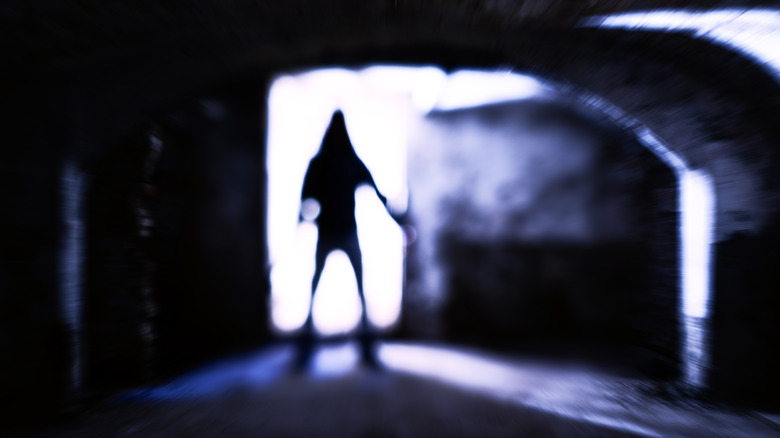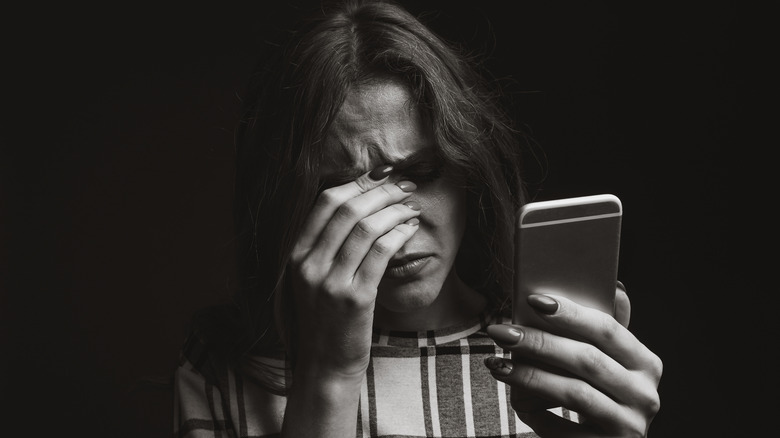How Does Consuming True Crime Affect Your Mental Health?
Let's be honest: It's not too hard to believe that a fixation with depraved, debased, deranged, and generally disturbing and nightmarish human behavior can mess with your head, right? If you don't think so, feel free to take a walk outside. Or don't, because literally anyone could be a psycho killer in disguise waiting to hack you into bits. Best stay inside safe on the couch and tune into this week's true crime extravaganza that will totally justify your decision to stay ferreted away for good.
All gags aside, and beyond common sense, health professionals like those at the Cleveland Clinic agree that too much true crime is bad for the brain. It's natural to be curious about aberrant human behavior, yes, but only so far. In fact, as Psychology Today outlines, psychologists like Robin Dunbar have suggested that humanity's entire use of complex language has roots in gossip and the need to share information about this or that friend or foe. It makes sense for a species as social as ours, but ultimately we've got to collaborate and trust each other or nothing meaningful gets done.
True crime, then, takes the role of fireside tale-teller, informing about spooky goblins and specters: "Watch out, children, or the boogeyman will get you." On that point, the Cleveland Clinic says that true crime affords people a way to identify danger and prepare for how to deal with it. But too much and you'll be left feeling scared and anxious all the time.
Embellishment, paranoia, and confirmation bias
There's a whole litany of studied, measured, and confirmed harmful psychological effects connected to consuming too much true crime. Like we mentioned in this article's tragically comical opening, a 2020 study in Crime & Delinquency found that folks who absorb too much true crime report feeling more paranoid about crime in real life, regardless of actual rates of criminal activity. Consuming true crime leads to a psychological embellishment of the prevalence and severity of crimes, aka confirmation bias: The tendency to seek out information that confirms pre-existing beliefs. It also leads to a tendency to dramatize how crimes play out. This makes sense because true crime — like any other form of docudrama meant to keep viewers watching and money flowing into a distributor, outlet, or studio — is a dramatized interpretation of reality, like how romcoms depict over-the-top, unreal versions of romantic relationships.
Wired confirms these findings, which themselves produce further, compounded problems thanks to everyone's favorite misused tool of information democratization: the internet. Citing one true crime fan Ben Coccio as an example, the outlet explains how Coccio would prowl the internet — particularly Reddit — to seek out information on what fellow fans felt about the true-crime podcast "Serial." He felt "worked up," "anxious," and "manic" all the time, and found that online squabbling and disagreements about the podcast only added to his stress. Others like Marcus and Meghan encountered petty personal attacks when reaching out to true crime communities online, which proved terrible for their mental health.
The fight-or-flight response
When we talk about true crime producing increased feelings of anxiety or paranoia about crime in everyday life, we're talking about a measurable set of nervous system responses commonly called the "fight-or-flight" response. In short, the body toggles between nervous systems depending on danger: the sympathetic (active) and parasympathetic (at rest). So if you're feeling anxious about giving a presentation or going to a party without knowing anyone? To the body, those are no different from facing a bear in the woods and having to make a choice: fight or flee. In either case, the sympathetic nervous system flips on and causes the heart to beat faster, blood to pump more quickly, lungs to inhale and exhale more oxygen, etc., to prepare the body to take action. Consuming true crime, in other words, keeps you "switched on" all the time. As Vice explains, such "hypervigilance" can cause stress-related problems beyond obvious psychological distress like heart disease or high blood pressure.
Verywell Mind explains that such physiological mechanisms are meant to keep us safe from danger. Psychological awareness of danger ought to match physiological, protective response mechanisms. But in the case of true crime, there is no actual danger. The threat is imagined, on a screen or in headphones, and in fact stands out from everyday, normal life because it's so exceptional and uncommon. In correct doses, and at the right moments, such instincts are useful. But too much, all the time, only misinforms and exhausts.
Taking a much-needed health break
So if "too much" true crime is the problem, and not just true crime itself, then when is too much too much? Well, that's up to the reader. It's no different from knowing when you're on the way to drinking too much, or need to pull back from work before you burn out, or need to step out of a harmful relationship. That's serious talk, but mental health is nothing to mess with, and it 100% will not take care of itself — same as physical health. Mental health requires active steps, even when talking nothing more than watching a TV show or listening to a podcast. But lucky for all of us, some active steps are exceedingly simple — like click, off it goes. Now go outside and chill. Or read a book. Or bang out some push-ups. Or go shopping. Or do anything at all that keeps you connected to the real world and not stuck in the mindscapes of society's sickest individuals.
Just to drive home the point that it's manner and quantity of consumption that's the issue, clinical psychologist and the founder of MindTribe Dr. Prerna Kohli told The Indian Express that in some cases true crime can actually reduce anxiety and help individuals feel prepared and aware. Also, vicarious experiences of danger can be benign, like watching a car chase or shoot-out in an action movie, but only if they're kept at an emotional arm's length. So go ahead and enjoy true crime, but don't let the monster consume you.
If you or someone you know needs help with mental health, please contact the Crisis Text Line by texting HOME to 741741, call the National Alliance on Mental Illness helpline at 1-800-950-NAMI (6264), or visit the National Institute of Mental Health website.



